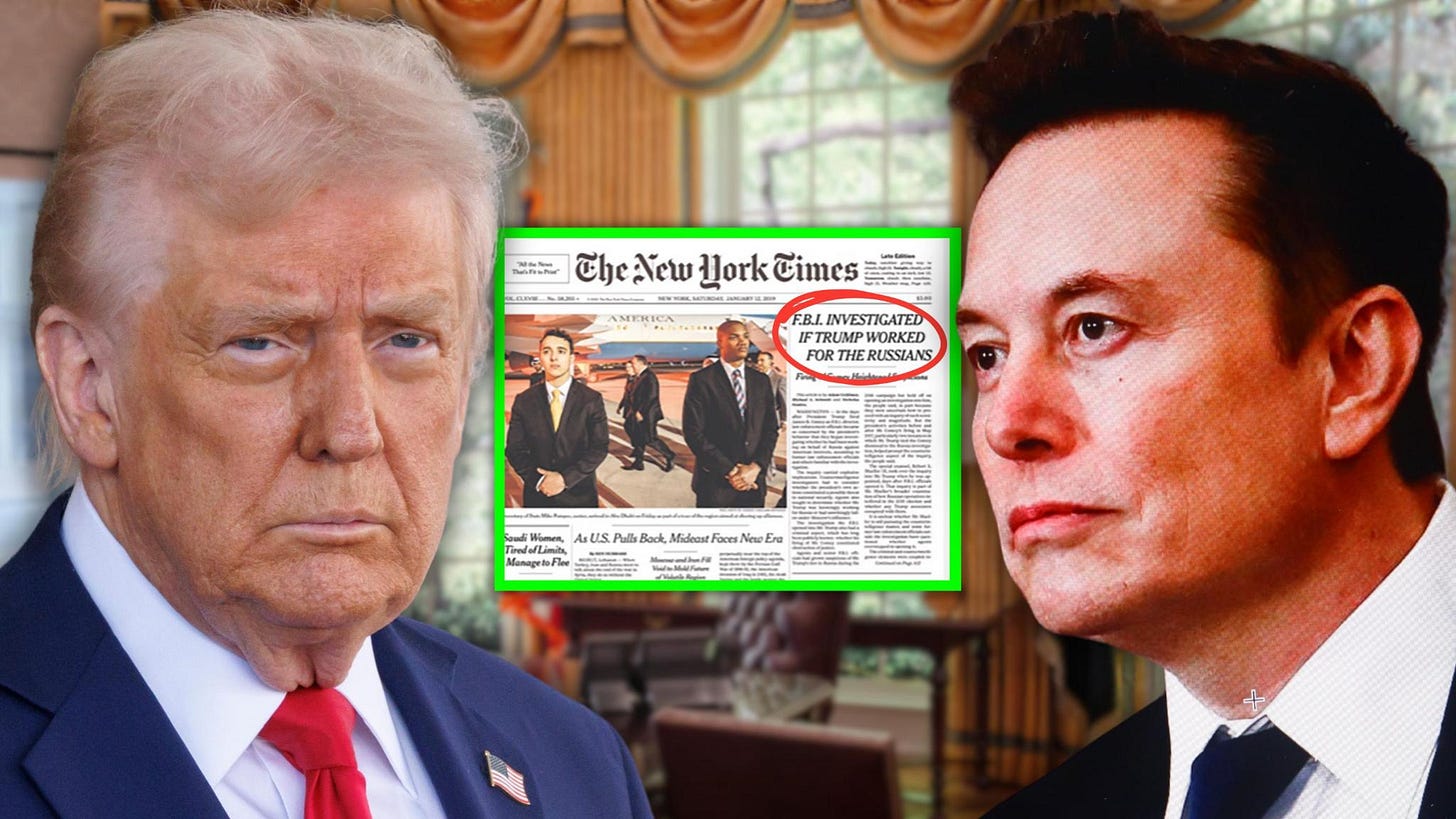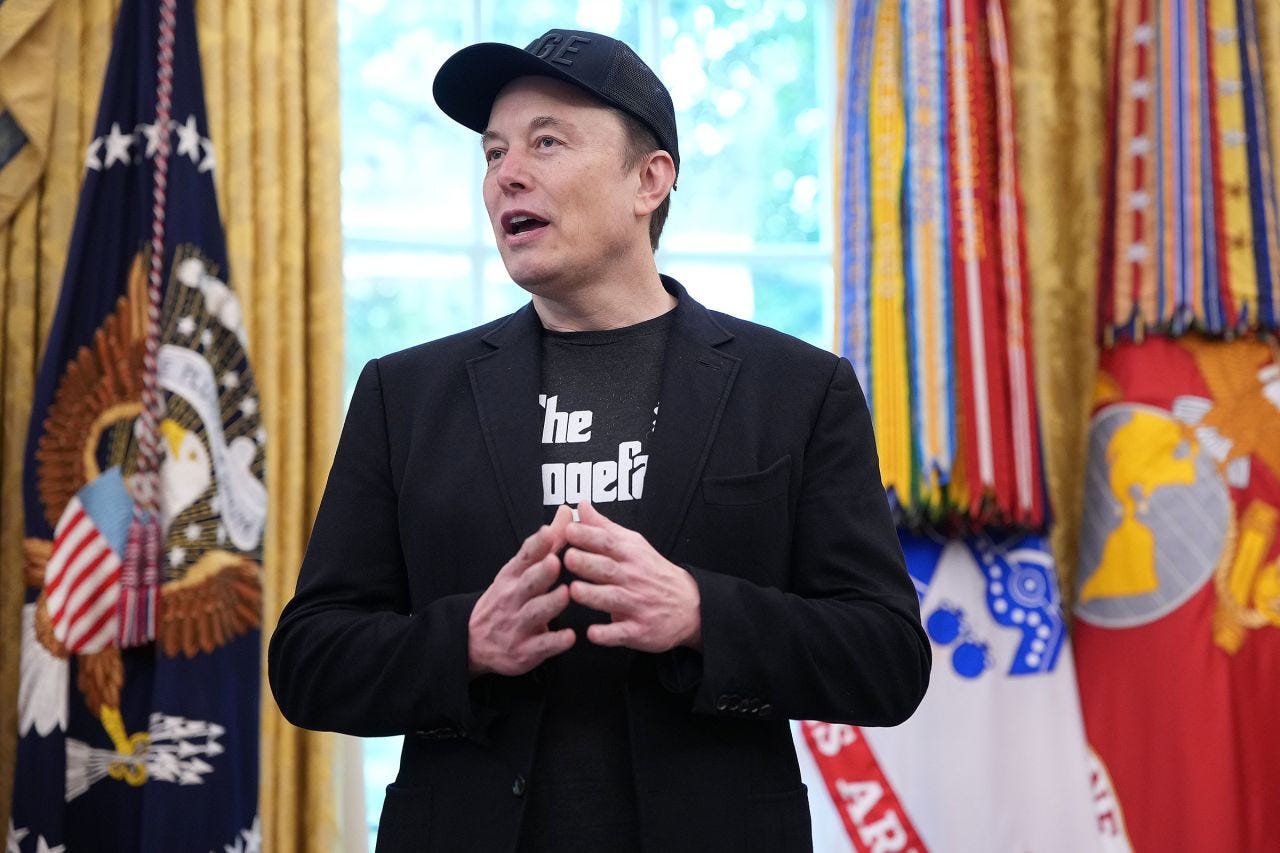Elon Musk Declares 'DOGE Influence Will Only Grow Stronger' in White House Farewell
After months of relentless media attacks, Musk finally unloaded on The New York Times.
The press conference marking Elon Musk’s departure from the Trump administration wasn’t your typical sendoff.
It opened with a curveball only Trump would throw.
Sitting beside Elon Musk in the Oval Office, Trump kicked things off by praising Musk for his DOGE efforts, before turning the cameras to CNBC.
“It’s an honor to be with Elon, who’s my friend and he’s done a fantastic job. He didn’t need this,” Trump said.
“And we find that government’s a little nasty on occasion.”
Then, in classic Trump style, he gave the media something to chew on.
“I think what I’ll do, if you don’t mind. Numbers have just come out which are rather extraordinary, and I thought I’d play a tape of one of the people who I’ve respected over the years—Joe Kernen and Rick Santelli.”
“This just came out and we’ll just play that for a second.”
The clip spotlighted rising personal income and a trade deficit that had been cut in half.
Trump made sure every lens in the room caught it.
But the moment that followed carried more weight.
It would be eye-watering for many who watched his whole journey.
Musk stepped forward to deliver his goodbye—not as a tech billionaire, but as a man who’d embedded himself inside one of the most dysfunctional systems on earth in an attempt to fix it from the inside.
“Well, let me say perhaps a few words,” Musk began.
Musk made it clear that DOGE was not going anywhere, it was just getting started.
“This is not the end of DOGE, but really the beginning.”
His time as a special government employee had run its course, limited by design. But the mission, he said, was far from over.
“The DOGE team will only grow stronger over time. The DOGE influence will only grow stronger.”
He compared the movement to a “burst of buddhism,” something deeper than policy or bureaucracy. A mindset. A way of life.
“It is permeating throughout the government,” he explained.
“I’m confident that over time we will see over $1 trillion in savings—a trillion dollars of waste and fraud reduction.”
For Musk, the legacy of DOGE wouldn’t be measured in headlines. It would be measured in momentum.
That same momentum, according to investor Kevin O’Leary, had already begun to reshape how Americans think about government itself.
In a recent interview, O’Leary argued that Musk’s real accomplishment wasn’t just financial, it was actually psychological.
“Bringing the whole idea of a different kind of audit into the psyche of bipartisan taxpayers,” he said.
“DOGE is a good idea. It just is.”
Auditing the government, regardless of who’s in charge, was now on the table in a way it hadn’t been before.
“Trying to make it more efficient is a good idea.”
O’Leary’s point was simple: the ideas behind DOGE were no longer niche. They had gone mainstream.
That shift in perception wasn’t lost on the press.
And when the floor opened to questions, it didn’t take long for the media to test Musk’s patience.
Fox News correspondent Peter Doocy asked the obvious: “The president mentioned that you had to deal with all the slings and arrows during your time at DOGE.”
Musk was waiting.
“Some of the media organizations in this room were the slingers.”
Then came the confrontation.
Doocy pointed to a new New York Times report, questioning Musk’s role and accusing him of blurring the lines between government and private influence.
Musk fired back.
“Oh wait, wait. The New York Times, is that the same publication that got a Pulitzer Prize for false reporting on the ‘Russiagate’?”
“Is it the same organization? I think it is!”
Musk reminded everyone that a judge had recently ruled against The Times for its coverage of the now-debunked Russia collusion narrative.
“They might have to give back that Pulitzer Prize,” he said, before dismissing the The Times story altogether.
“That New York Times? Let’s move on! Next question.”
Destroyed.
It’s worth noting: Musk dismantled the media and roasted The New York Times—while rocking a DOGE cap and a shirt that read “The Dogefather” under his black blazer.
Legendary doesn’t even begin to describe it.
One reporter did take things in a lighter direction, noticing a visible bruise near Musk’s eye.
“Can I ask quickly Mr. Musk, is your eye okay? What happened to your eye? I noticed there’s a bruise there.”
Musk smirked. “Well I wasn’t anywhere near France,” he said, taking a playful jab at Brigitte Macron’s infamous slap.
Then he explained.
“Yeah, no, I was just horsing around with little X and I said go ahead and punch me in the face and, he did. Turns out even a 5-year-old punching you in the face actually does—”
Before he could finish, Trump jumped in.
“It was X that did that? X could do it! If you knew X, he could do that.”
As the event drew to a close, Musk offered one final reflection—not just on DOGE, but on the machinery of government itself.
“There are many things that occur in the government because it’s the banal evil of bureaucracy,” he said.
What followed was a blunt diagnosis of a system that seems designed not to solve problems, but to survive them.
“It’s sort of the, frankly, largely uncaring nature of bureaucracy,” Musk explained.
Then he turned to Milton Friedman, quoting a line that had clearly stayed with him.
“As the great Milton Friedman said: ‘Money is spent most poorly when it is someone else’s money being spent on people you don’t know.’”
That, he said, is how federal spending works.
And fixing it? Nearly impossible.
“You can’t really even blame the individuals,” Musk continued, “because the way the government works is complaint minimization. When someone within the government tries to stop that money being spent, there’s usually someone that complains—and then their manager will say, it’s not worth the trouble.”
Still, Musk ended on a note of optimism.
“I think it was an important thing, I think it was a necessary thing, and I think it will have a good effect in the future.”
The message was clear: he may have been stepping away, but DOGE—his vision for a leaner, more honest government—was just getting started.
No matter how this all ends, Musk did what few ever could.
He started a revolution. He didn’t have to do this—but he did it anyway. For the people.
Despite the defamation, the media smears, and even the firebombings of Tesla facilities.
For once, someone stood in the gap—challenging the rot of bureaucracy from the inside.
And to anyone who witnessed the era of DOGE, Musk will always be the legend who brought it to fruition.
This story was made possible with the help of Overton —I couldn’t have done it without him.
If you’d like to support his growing network, consider subscribing for the month or the year. Your support helps him expand his team and cover more stories like this one.
We both truly appreciate your support!






Great job, I’m glad to see DOGE will continue on.
Almost every citizen would love a DOGE in thier State it would be magnificent! Maybe United States of America will thrive again!